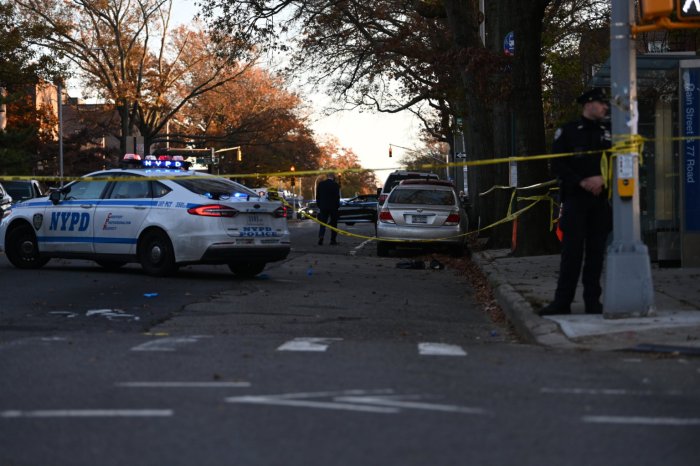By Alex Berger
On Nov. 12, we will celebrate another Veterans Day.
It is a well-deserved tribute. Americans will pay homage to the solders — men and women — who fought for freedom in past wars and struggled for peace between the wars. Through it all, they stood tall protecting our democracy.
A great deal of gratitude is owed to these heroes, especially to those who fell fighting our country’s enemies. Today, a new group of superb men and women, on distant battlefields, are wearing the same military uniforms and repeating the same acts of valor and gallantry as did their fathers and grandfathers before them. We salute them.
However, since many other columns this year will be devoted to our soldiers now fighting in Afghanistan, I will instead relate the stories of two ordinary veterans who fought hostility from within, and won.
It was during the Korean War. A 17-year-old New York City boy, upon his graduation from Stuyvesant High School, decided not to go on to college as nearly all his classmates were doing. Instead he enlisted in the Air Force, because his country was at war.
He was sent to Sampson Air Force Base in upstate Geneva for basic training. The teenager pledged that he was going to be as good a soldier as his older brother, Jack was in World War II.
On the first day of basic training, the young recruit was proud to pin his nameplate on a brand new set of fatigues. He quickly made friends and was quite happy.
On the third day, while he was standing on the chow line for breakfast, he felt a tap on his shoulder. The young man turned around and suddenly, felt a warm, wad of saliva hit his face. . He had been spat upon by the fellow recruit standing in back of him, who was unknown to him..
The abused airman (who hailed from the tough streets of Lower Manhattan) fought back. He tackled his assailant and his eyeglasses flew of fhis face as the two of them began punching one another. It wasn’t long before they were separated by members of the Air Police and brought before the captain.
“Airmen!” shouted the angry captain. “This is just your third day of basic training and already you committed a major infraction. Don’t you know that fighting among ourselves is not tolerated in the United States Air Force? I want to know why you were fighting.” There was silence.
“I am ordering you to tell me what started the fight,” the captain demanded.
There was more silence. The captain stared at the two frightened recruits in front of him for five long minutes. He then ordered the Air Police to release them. “I like your concern for one another,” he said approvingly. “But no more fighting or it’s the stockade for the both of you.”
As the two of them were walking together to the barracks to rejoin their squadrons, the offender said, “Thanks for not ratting on me. You are a good Jew. I didn’t lmow that Jews have a code of honor. And you are the first Jew who can fight.” The other recruit asked how he knew that he was Jewish. “Simple — from your nameplate,” he said. The Jewish airman never again experienced an act of anti-Semitism during his four years in the Air Force. That young man of course, was me.
A few years ago, I was seated in the barbershop, waiting my turn for a haircut. Sitting next to me was an elderly gentleman. He was wearing a Veterans of Foreign Wars cap, and a military medal was pinned to his jacket. I began a conversation with him At first he merely grunted when replying to my questions, but he soon opened up and became quite talkative during the long wait. He said his name was Frank, but he wouldn’t tell me his last name. He was 78 years old lived in Whitestone, and spoke with a strong Italian accent He had emigrated to the United States from Italy just before World War II began and was soon drafted into the army.
During the war, Frank earned a few military medals. He was stationed in southern Germany at war’s end and was able to get a short furlough to visit his parents in a small village in northern Italy. He hadn’t seen them for several years and was worried about them.
Frank began the trip on foot since there was no public transportation, and managed to hitch rides on Army Jeeps . For three days he traveled until he reached a checkpoint in Italy a few miles from his parents’ home. He was questioned by a young lieutenant.
Frank explained that he wanted to visit his parents a few miles away, for just one hour, because he was worried about them. The lieutenant denied permission to go any further because Frank did not have the proper papers to travel beyond the checkpoint. He was ordered to return to Germany to get his papers changed.
Frank boarded a train to return to his army base, but when the lieutenant's back was turned he threw his duffel bag out the train window and jumped from the train. The lieutenant caught him and, at gunpoint, ordered Frank handcuffed and arrested.
Frank was put into a Jeep going back to Germany where he would be confined in the stockade for disobeying orders. But the military police saw the medals on Frank’s uniform, unlocked his handcuffs, and set him free.
Frank continued his voyage and stopped at another checkpoint. He told his story of wanting to see his parents in Italy for just one hour. A major standing nearby heard it and advised Frank to wait. He soon reappeared with new, temporary papers reassigning Frank to the major’s company for eight days. The major then contacted Frank’s company in Germany and told them that Frank was needed in his company because of his ability to speak Italian.
Frank went on to spend eight loving days with his parents, where his mother washed, cleaned, and ironed every article of his uniform including his duffel bag.
When his eight-day furlough was over, Frank returned to the original check-point. He searched for and found the young lieutenant who previously ordered him placed in handcuffs. He showed the lieutenant his second set of papers. When the surprised officer handed the papers back, Frank dusted his immaculately clean uniform, stood at attention, and gave the officer a snappy salute. Frank was still smiling as he boarded the train taking him back to his unit in Germany.
Reach columnist Alex Berger by e-mail at timesledger@aol.com or call 229-0300, Ext. 139





























